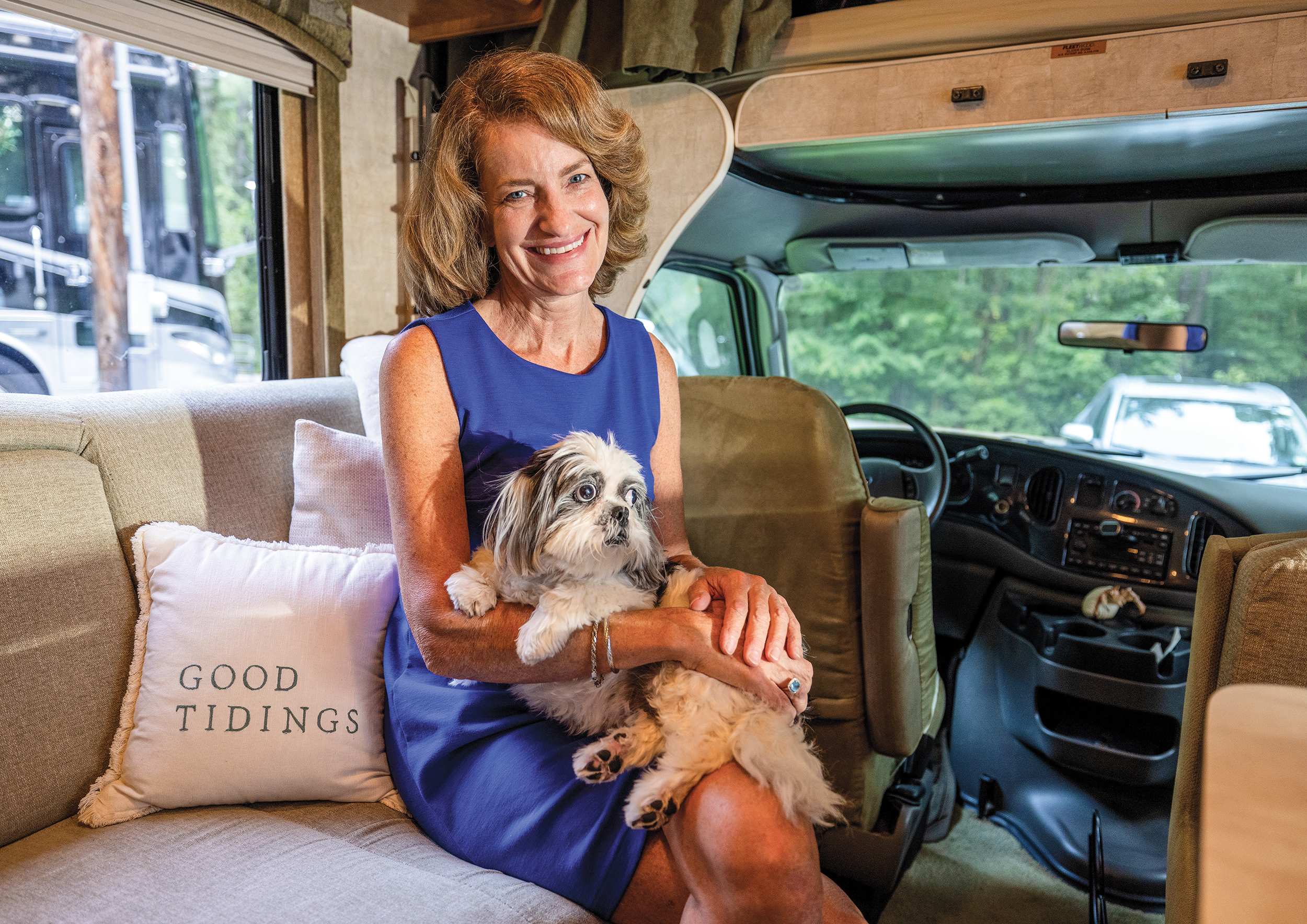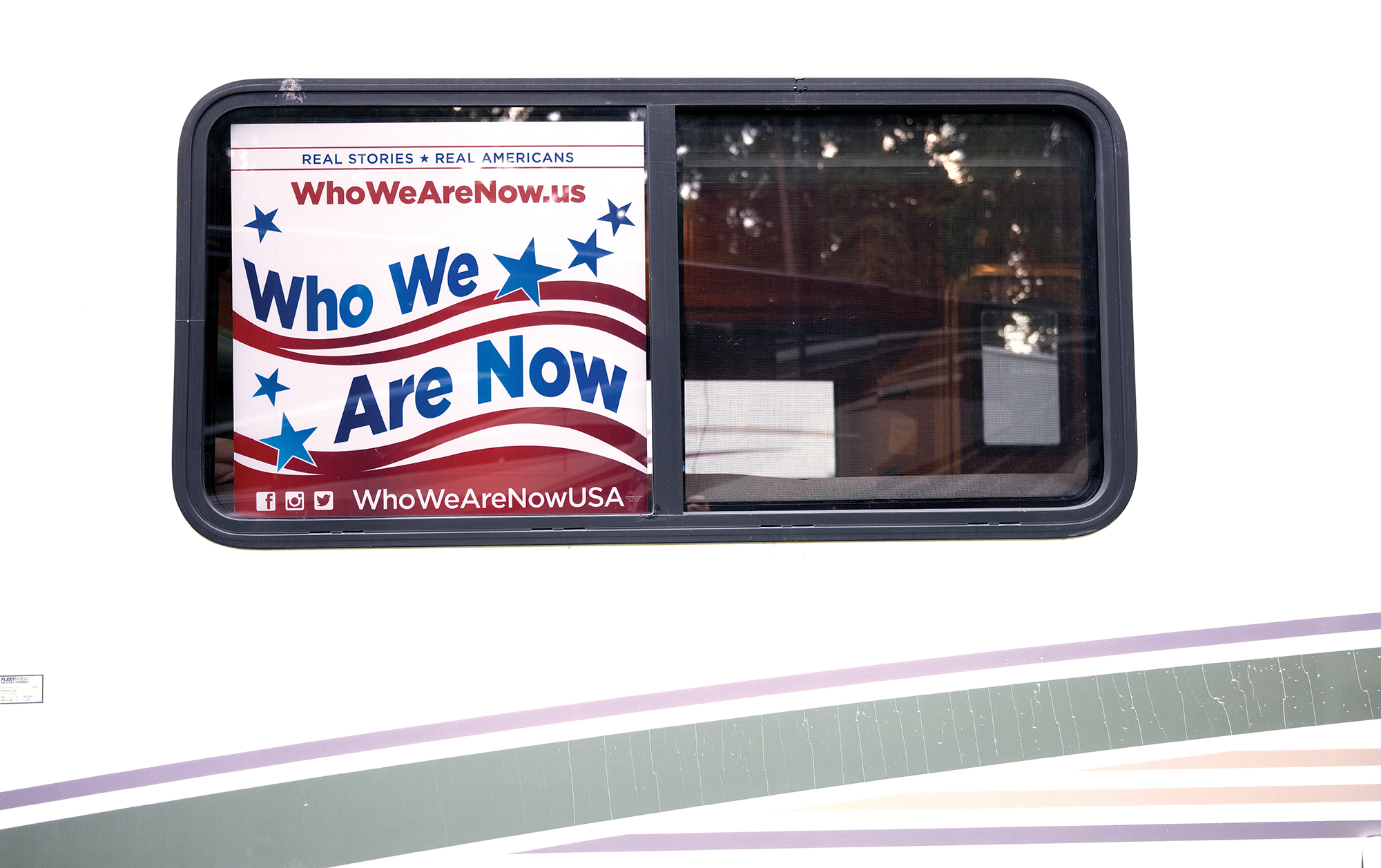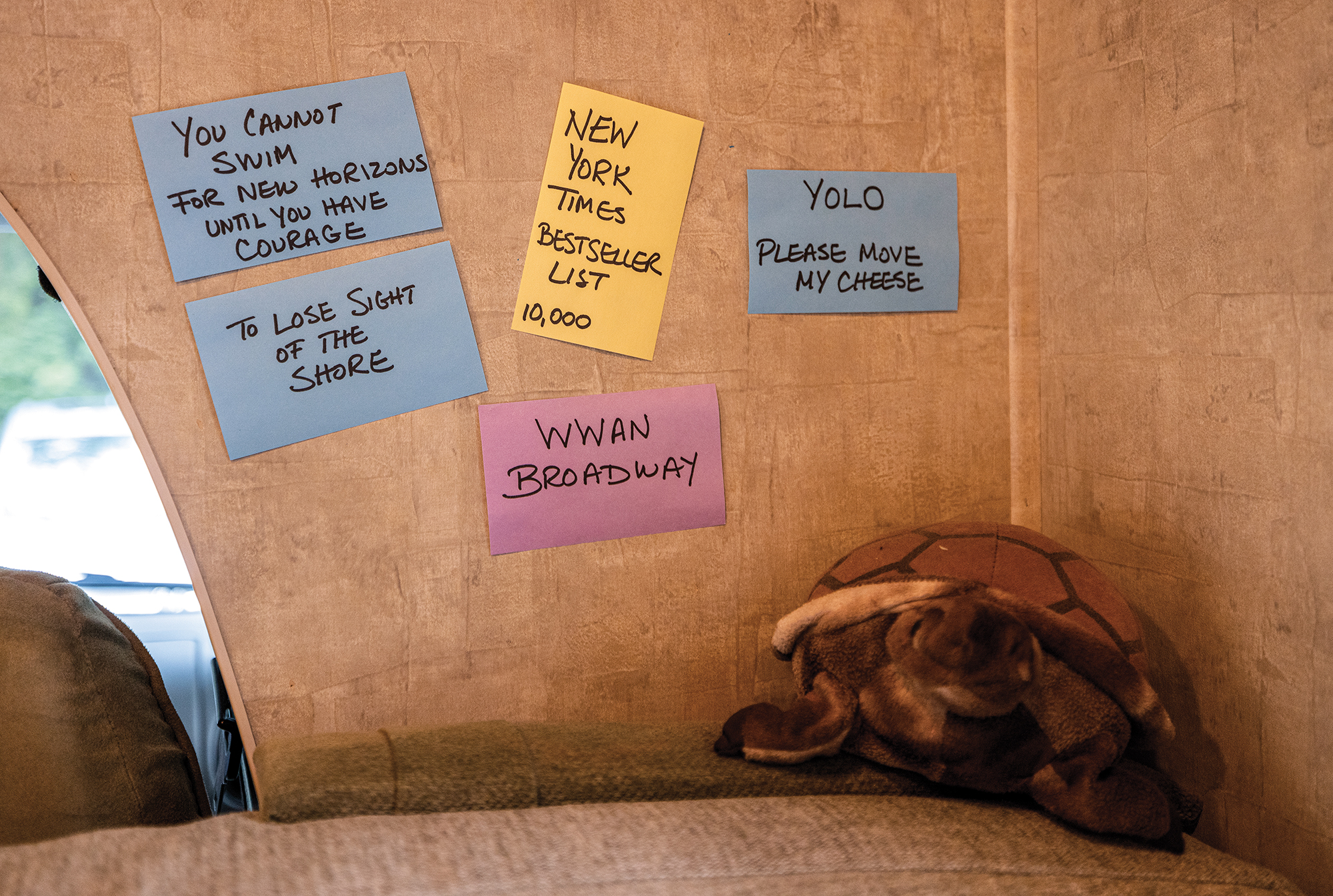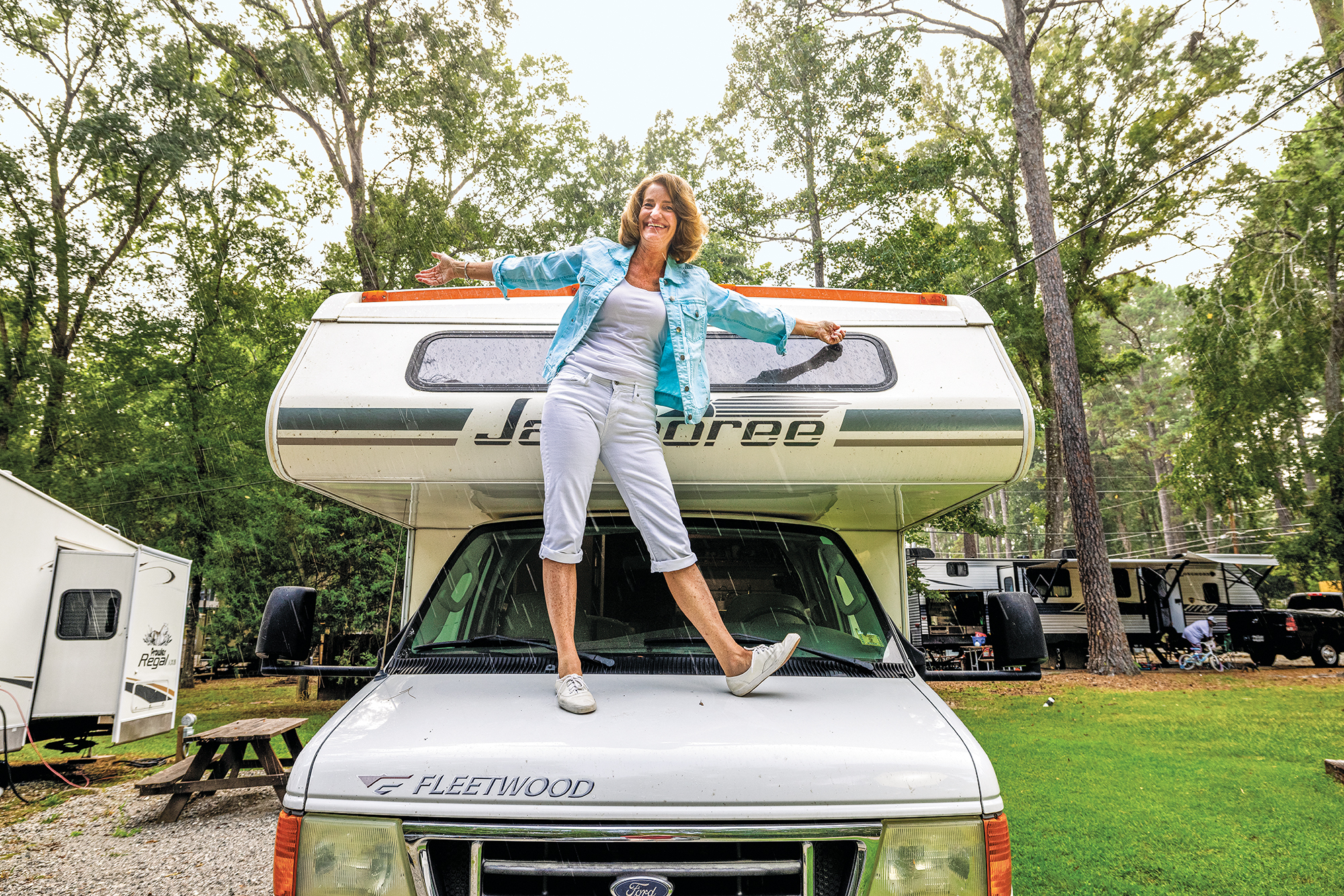On the Road in the Pandemic
Posted on Sept. 24, 2021
Michelle Fishburne ’84 says she’s not an oral historian, but for six months in 2020, she collected 300 stories from people in 37 states and Washington, D.C., capturing the day-to-day lives of Americans during a time of heightened political, social, racial and economic polarization. (Grant Halverson ’93)
Michelle Fishburne ’84 is quick to point out that, although she spent six months crisscrossing the United States collecting oral histories, she’s not an oral historian. She just wanted to chronicle how people were making their way through the unique challenges posed by the coronavirus pandemic because that was a uniquely challenging time for her as well.
When Fishburne lost her public relations job in the early days of the pandemic in 2020, she thought she would soon find another position, even if it wasn’t in public relations. After all, the 57-year-old Chapel Hill resident had a degree in political science from UNC, a law degree from the University of Virginia and decades of connections in a variety of business sectors. Yet, as the end of summer rolled around and she was still without a job, she considered Plan B — taking a break from traditional employment altogether.
Fishburne owned a 29-foot Fleetwood Jamboree motorhome she had purchased 15 years earlier when she homeschooled her two children, now 21 and 19. Being an empty nester gave her options. “The lease on my house had expired, I had my curiosity and my motorhome,” she says.
Fishburne describes herself as an intensely curious person who believes everybody has a story to tell. “I really enjoy listening to people’s stories and finding the nuggets that resonate and sharing them with other people,” she says.

(Grant Halverson ’93)
So, in September 2020, Fishburne moved her belongings into storage, loaded up her shih tzu, Buddy, and hit the road. That’s how the “Who We Are Now” project was born. For the next six months, she captured the day-to-day lives of Americans during a time of heightened political, social, racial and economic polarization.
Her quest to catalog the voices of everyday people has sparked comparison to the late Charles Kuralt ’55 and his long-running CBS “On the Road” series. But she believes John Steinbeck’s Travels with Charley: In Search of America is a more apt analogy. Like the questions that drove the novelist when he began his 1960 trek across America with his poodle, Fishburne also wanted to know: “Who are Americans today? Will I know my country?”
In the first states she visited — Virginia, West Virginia, Ohio and Indiana — Fishburne struggled to meet people because pandemic restrictions had businesses closed and everyone sheltering at home. Then she searched Facebook, what she calls the new town square, to see what was happening in the community and make connections.
Over the course of her 12,000-mile trip, Fishburne collected 300 stories from people in 37 states and Washington, D.C. She expected to see the tense, contentious encounters of a fragmented nation that play out on cable TV. Instead, she found more nuanced conversations and reasons to hope. She encountered people who, despite vastly different political views, held similar hopes for their lives and those of their families and the people they love.

Fishburne calls her RV The Turtle because it carries its house on its back. Inside is what she calls her “aspiration wall.” (Grant Halverson ’93)
She talked to people close to home, such as the editor of The News of Orange County in Hillsborough, and far away, including a panhandler in Cheyenne, Wyo., and a gun shop owner in Shamrock, Texas.
“I was very intentional about building a mosaic of stories that represented Americans’ lived experiences, making sure to cover a wide spectrum of demographic groups and professions,” she said. “My mother had a Ph.D. in sociology, and she taught me the importance of having a representative sample and asking neutral, nonleading questions.”
Fishburne began every interview the same way: “It’s January 1, 2020. What was your 2020 supposed to be like and how did it turn out so far?”
Kristina Wong, a comedian in LA’s Koreatown, had just launched her first national tour when COVID-19 hit. She went from standing ovation crowds to sitting in her apartment with nothing to do. So she pulled out her “Hello Kitty” sewing machine and recruited hundreds of volunteers to sew and deliver more than 250,000 face masks for people in vulnerable communities across the country. Her story is now a book, and she’s headlining a one-woman show Off-Broadway this fall in New York City.
Nate Thomas is known as the “Arkansas Running Man.” When Fishburne met him at the end of October, he had logged 882 miles and worn out six pairs of shoes running all over Arkansas with “Old Glory” held high to keep spirits up among his fellow Arkansans.
Fishburne also credits her family for being the genesis of this adventure because motorhoming runs in her blood. “I am now the third-generation ‘Nomadlander’ in my family,” she says, referring to the Oscar-winning film and nonfiction book Nomadland, about a woman who adopts a nomadic lifestyle after losing everything in the Great Recession.

(Grant Halverson ’93)
“In 1936, my grandfather lost his job, and he and my grandmother lived in a trailer for two years,” Fishburne says. “For a time, my parents did not have a house by choice, and they lived in their motorhome from 2002 to 2009. Now, here I am living in an RV.”
For the foreseeable future, Fishburne is bouncing between Airbnbs and her motorhome parked at an RV campground between Chapel Hill and Durham. It’s a bit of an odd life for someone who’s called Chapel Hill home for more than 20 years. Nonetheless, she says she wouldn’t trade the experience for the world.
“Besides being a mom, it’s the most consequential thing I’ve done in my life,” she says. “I got this glorious opportunity to collect contemporaneous oral histories at a really critical time in our country’s history. At the same time, I found out that this is what I want to do for the rest of my life. I would not have discovered that if I’d stayed in my cozy house.”
She spends her days working on Who We Are Now: 100 Stories of What We Lost and Found During the Pandemic, which will be published by UNC Press in fall 2022. She also is spending time with her daughter, a junior at UNC, completing a study for a global think tank and seeking employment. She will resume her vagabond lifestyle when the book is released, touring the country in her Fleetwood Jamboree wrapped as a Who We Are Now book jacket.
— Melba Newsome
Thanks for reading the Carolina Alumni Review
Carolina Alumni members, sign in to continue reading.
Not yet a member? Become one today.
